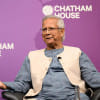Labour's challenge after landslide election win

The British election is now over, and the results are in. According to latest reports, the Labour Party has won a landslide victory with 412 seats in the 650-seat House of Commons. The Tories have lost 251 seats, and they are now left with 121 members in the new parliament. But beyond the numbers, there are some trends worth taking into account.
The voter turnout was about 60 percent, the lowest in 20 years. The apathy among the voters about the political process is clear. The theme of "change" of the Labour Party has resonated with the voters, who seemed to be sick and fed up with the Tories and their policies. Smaller parties like the Green Party or Reform UK have remained, as usual, marginal. The expectations among people from the Labour government will be high and if not delivered, the frustration may set in early. Finally, what can be done will depend not only on domestic dynamics, but also on international events. As the Labour government sets to tasks, there are a few formidable challenges they will have to tackle.
To start off, apart from socio-economic divisions, the British society has become highly divisive along ethnic, religious, regional, immigrant, and non-immigrant lines. Britishness, in terms of value and tradition, has decayed a lot. If the new government wants to succeed, it has to restore the social cohesion among various groups. Diversity, if managed well, can be a strength. But mismanaged, it can lead to divisions.
Despite having always boasted about being a welfare state, Britain's social services are decaying. The National Health Services (NHS) is a prime example. There is a dearth of doctors and nurses, hospital beds have become a scarce commodity, patients have been on the waiting list for necessary surgery, and there are shortfalls in resources. But the problem is not only in terms of resource shortage, but also of the abuse of the system. Abuses are prominent in all kinds of social assistance systems. However, privatisation of the social services is not the solution. Rather, the British social service system requires fundamental structural reforms.
There is no doubt that the inflation rate has come down significantly, but that has not solved the economic challenges that common people face in their day-to-day life. Joblessness is a problem, energy prices are still high, the housing market is not friendly to common people. At the macro-level, economic growth is sluggish and with Brexit, Britain has become isolated and deprived of the benefits and the privileges of the European Common Market.
Beyond all of this, immigration remains a hotly debated issue in the British society. It is now recognised that it is not always illegal immigration which is the problem; it is also legal immigration. Through the loopholes in immigration laws and the lenient policies of the British government, it is not only people needed by society who have entered the country, but also people who are dependent on the social assistance system, which has put a heavy burden on it. But the more important problem is the perception that this has opened a door to fundamentalism and terrorism.
The effectiveness and the success of the Labour government will depend, to a large extent, on the international scenario. One of the defining issues in this regard will be the American presidential election later this year. If Donald Trump becomes the US President in November, the US-UK relationship under a Labour government cannot be expected to be warm and cordial and the environment may be tense. In addition, war in Ukraine and the Palestine crisis would have a lingering impact on the British economy. The past UK government had doled out huge amounts of resources to Ukraine, which has put pressure on the British exchequer. On the Palestine issue, the position of the Labour Party is rather hazy and unclear. The Labour government has to bring clarity to it.
Some of the election results indicate certain challenges as well. For example, the Scottish Nationalist Party (SNP) has got only nine seats in the new parliament, down 38 seats from the last parliament. It raises question on the standing of the Scottish independence. Have the Scottish voters lost appetite for this issue? Or do they think that the British parliament is not the appropriate platform for the concerns of Scotland? Similarly, Liberal Democrats have achieved the best results in 100 years, and have gained 60 new seats to become the third largest party in the Parliament. It is well-known that this party is strongly supported by the younger generation. Even though the Labour Party has absolute majority in the parliament, one challenge the party will have is how it interacts with Liberal Democrats in the broader policy contexts. People have not forgotten as to how in the coalition of Labour and the Liberal Democrats, the latter was marginalised by Labour.
In the coming days, the British people will observe with high expectations how the new government tackles all these challenges and steers the country forward. The honeymoon period will not be long. The theme of "change" is a healer, but if change is not delivered, it could be a "killer" too.
Dr Selim Jahan is the former director of UNDP's Human Development Report Office at UNDP in New York.
Views expressed in this article are the author's own.
Follow The Daily Star Opinion on Facebook for the latest opinions, commentaries and analyses by experts and professionals. To contribute your article or letter to The Daily Star Opinion, see our guidelines for submission.

 For all latest news, follow The Daily Star's Google News channel.
For all latest news, follow The Daily Star's Google News channel. 










Comments